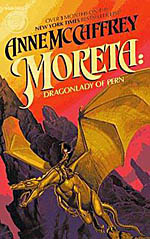
![]() couchtomoon
couchtomoon
5/29/2014
![]()
As a kid who devoured Nancy Drew and Baby-sitters Club novels, then Kurt Vonnegut and Marion Zimmer Bradley as a teen, I can't quite place where Anne McCaffrey's Pern series would go on the recommended reads for child development chart. Its style and content seem ideal for the ages 3 to 7 crowd, yet there are some sexy moments that seem a little too sophisticated for young kiddos. But I'm not sure an older child or young teen would buy the whole space-dragon on a medieval future world premise. I know I wouldn't have.
Moreta: Dragonlady of Pern is the prequel to McCaffrey's extensiveDragonrider series, which serves to explain the legendary tale of the famous dragonrider, Moreta, who is often referenced in the earlier-published, but later-occurring novels. Moreta is a dragonrider/dragonhealer/weyrleader who lived 1000 years prior to the events of the first published Pern novel. Little is known about her because the Pernese suck at recording history (they do this on purpose, sometimes), but her adventures and tragedies are immortalized in song and poetry. Basically, it's a story about a story from the story.
So what do you do when your people settle a planet and abandon all mechanized technology, only to discover your new planet is bombarded by sizzling thread every 100 turns? You genetically-engineer dragons to combat the thread, and (quietly) discover time travel via said dragons. Obviously. And everything works out perfectly until... FLU PANDEMIC!
Moreta and her golden queen dragon, Orlith, are eagerly awaiting the end of the current thread cycle, eight years away. Both are in the prime of their lives and their careers, important to their weyr community and throughout Pern. They go to a gathering at Ruatha Hold, and Moreta enjoys racing and dancing with the hot Lord Holder Alessan. But when a runner and a rider fall mysteriously ill, Pern is faced with a problem that dragonriding can't solve. Moreta is swept into the crisis as her Weyrleader Sh'gall and Masterhealer Capiam become bedridden, and many of Pern's holds are wiped out by the virus. Moreta must use her skills as a rider, a dragonhealer, and a leader to stop the crisis... all while Orlith is pregnant with Pern's most important clutch of eggs!
Although Pern is praised for its undercurrents of feminism, the first two novels in the series didn't meet my expectations, mostly due to Pern's paternal feudal society led by grumbling male Weyrleaders and Lord Holders, a vain female side character, and only one standout female lead who breaks all the rules, yet remains the exception. By Moreta,seven books into the series, that feminism is well-established, giving the Weyrwoman unquestioned authority and independence, including freedom of sexual relations without implications, even within a Weyr partnership in which her dragon chooses a mate whose rider does not appeal to Moreta. Her relaxed attitude toward relationships demonstrates an overt criticism of the possessive nature of romance in our society.
McCaffrey's version of motherhood is also rather progressive, even by today's standards. Moreta has had an unaccounted for number of children with several different men, all of whom are fostered to other weyrs and holds, yet she is neither viewed as a slut, nor as a neglectful mother. It can be assumed based on an interaction with one of her children that the relationships between Moreta and her fostered children are warm and loving, with no bitterness about the situation. The Pernese idea of child-rearing is almost more like the crèche style exhibited in other SF novels, where the community raises the children, allowing parents more time and energy to devote to their skills and personal development. In Pern, however, this option seems to be only available to the very important dragonladies—elitist in nature, but very unique, especially in a society that seems backward in so many other ways (feudalism, atavism, etc.)
Despite Moreta's inhuman feats of dragonriding, followed by dragonhealing, followed by time-jumping to collect the ingredients for a vaccine, followed by more time-jumping to vaccinate the entire planet within the incubation window, the story feels rather insubstantial. Considering the impact of a major pandemic, the emotionality of so many deaths is not conveyed well. After all, it is a children's book, and the pacing matches a child's imagination and comprehension. Even fans of the series complain of the book's lackluster plot, seemingly wedged into the series when McCaffrey ran out of fresh ideas but publishing pressures forced her to mine her own work. I was bored, to the point where I desperately hoped someone important would die—I often do this—forgetting that this is a story about a legend.
Legends always have a tragic end. And THAT'S when this book gets good!
By my third Pern novel, I think I have discovered a pattern: problems + more problems = time travel solution! I'll read more eventually, and we'll see if this pattern pans out.
http://couchtomoon.wordpress.com